Yaoming Zhu
LongCat-Flash-Thinking-2601 Technical Report
Jan 23, 2026Abstract:We introduce LongCat-Flash-Thinking-2601, a 560-billion-parameter open-source Mixture-of-Experts (MoE) reasoning model with superior agentic reasoning capability. LongCat-Flash-Thinking-2601 achieves state-of-the-art performance among open-source models on a wide range of agentic benchmarks, including agentic search, agentic tool use, and tool-integrated reasoning. Beyond benchmark performance, the model demonstrates strong generalization to complex tool interactions and robust behavior under noisy real-world environments. Its advanced capability stems from a unified training framework that combines domain-parallel expert training with subsequent fusion, together with an end-to-end co-design of data construction, environments, algorithms, and infrastructure spanning from pre-training to post-training. In particular, the model's strong generalization capability in complex tool-use are driven by our in-depth exploration of environment scaling and principled task construction. To optimize long-tailed, skewed generation and multi-turn agentic interactions, and to enable stable training across over 10,000 environments spanning more than 20 domains, we systematically extend our asynchronous reinforcement learning framework, DORA, for stable and efficient large-scale multi-environment training. Furthermore, recognizing that real-world tasks are inherently noisy, we conduct a systematic analysis and decomposition of real-world noise patterns, and design targeted training procedures to explicitly incorporate such imperfections into the training process, resulting in improved robustness for real-world applications. To further enhance performance on complex reasoning tasks, we introduce a Heavy Thinking mode that enables effective test-time scaling by jointly expanding reasoning depth and width through intensive parallel thinking.
CATArena: Evaluation of LLM Agents through Iterative Tournament Competitions
Oct 30, 2025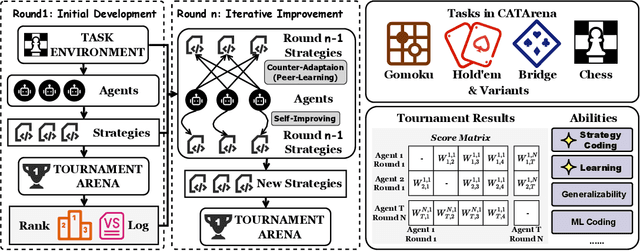



Abstract:Large Language Model (LLM) agents have evolved from basic text generation to autonomously completing complex tasks through interaction with external tools. However, current benchmarks mainly assess end-to-end performance in fixed scenarios, restricting evaluation to specific skills and suffering from score saturation and growing dependence on expert annotation as agent capabilities improve. In this work, we emphasize the importance of learning ability, including both self-improvement and peer-learning, as a core driver for agent evolution toward human-level intelligence. We propose an iterative, competitive peer-learning framework, which allows agents to refine and optimize their strategies through repeated interactions and feedback, thereby systematically evaluating their learning capabilities. To address the score saturation issue in current benchmarks, we introduce CATArena, a tournament-style evaluation platform featuring four diverse board and card games with open-ended scoring. By providing tasks without explicit upper score limits, CATArena enables continuous and dynamic evaluation of rapidly advancing agent capabilities. Experimental results and analyses involving both minimal and commercial code agents demonstrate that CATArena provides reliable, stable, and scalable benchmarking for core agent abilities, particularly learning ability and strategy coding.
OIBench: Benchmarking Strong Reasoning Models with Olympiad in Informatics
Jun 12, 2025
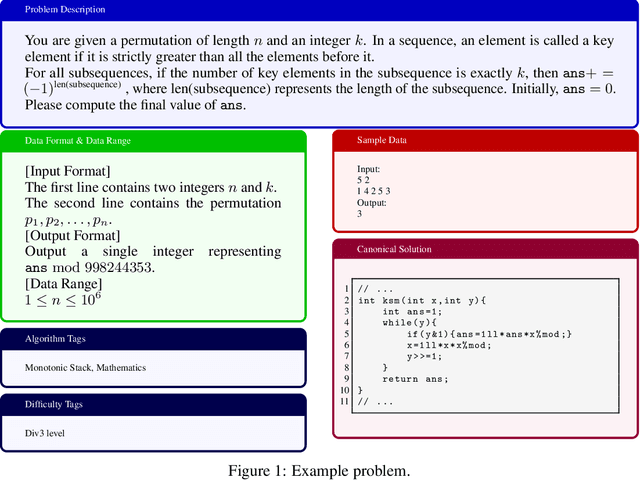

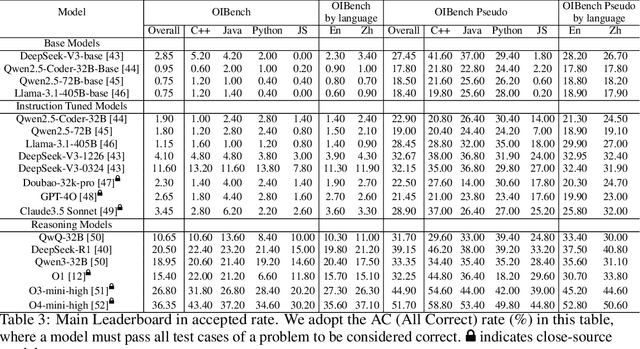
Abstract:As models become increasingly sophisticated, conventional algorithm benchmarks are increasingly saturated, underscoring the need for more challenging benchmarks to guide future improvements in algorithmic reasoning. This paper introduces OIBench, a high-quality, private, and challenging olympiad-level informatics dataset comprising 250 carefully curated original problems. We detail the construction methodology of the benchmark, ensuring a comprehensive assessment across various programming paradigms and complexities, and we demonstrate its contamination-resistant properties via experiments. We propose Time/Space Completion Curves for finer-grained efficiency analysis and enable direct human-model comparisons through high-level participant evaluations. Our experiments reveal that while open-source models lag behind closed-source counterparts, current SOTA models already outperform most human participants in both correctness and efficiency, while still being suboptimal compared to the canonical solutions. By releasing OIBench as a fully open-source resource (https://huggingface.co/datasets/AGI-Eval/OIBench), we hope this benchmark will contribute to advancing code reasoning capabilities for future LLMs.
Beyond Triplet: Leveraging the Most Data for Multimodal Machine Translation
Dec 20, 2022



Abstract:Multimodal machine translation (MMT) aims to improve translation quality by incorporating information from other modalities, such as vision. Previous MMT systems mainly focus on better access and use of visual information and tend to validate their methods on image-related datasets. These studies face two challenges. First, they can only utilize triple data (bilingual texts with images), which is scarce; second, current benchmarks are relatively restricted and do not correspond to realistic scenarios. Therefore, this paper correspondingly establishes new methods and new datasets for MMT. First, we propose a framework 2/3-Triplet with two new approaches to enhance MMT by utilizing large-scale non-triple data: monolingual image-text data and parallel text-only data. Second, we construct an English-Chinese {e}-commercial {m}ulti{m}odal {t}ranslation dataset (including training and testing), named EMMT, where its test set is carefully selected as some words are ambiguous and shall be translated mistakenly without the help of images. Experiments show that our method is more suitable for real-world scenarios and can significantly improve translation performance by using more non-triple data. In addition, our model also rivals various SOTA models in conventional multimodal translation benchmarks.
Unified Multimodal Punctuation Restoration Framework for Mixed-Modality Corpus
Jan 24, 2022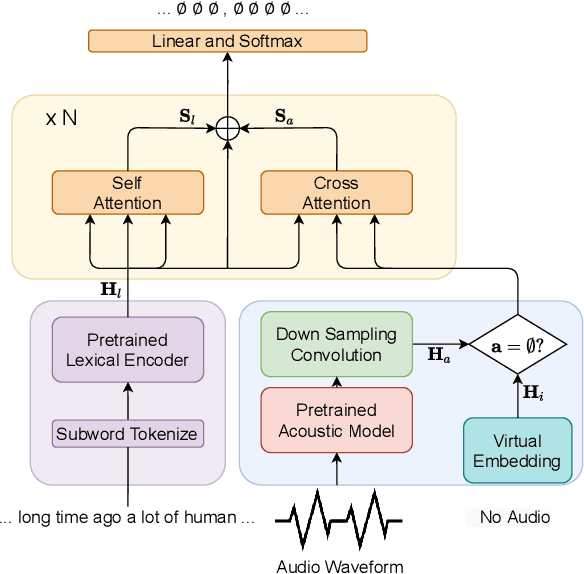

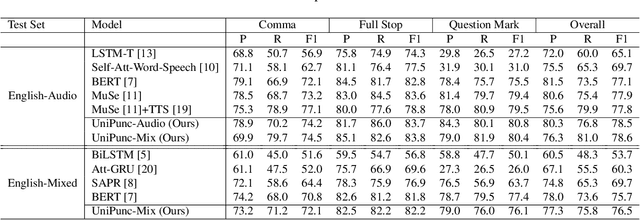

Abstract:The punctuation restoration task aims to correctly punctuate the output transcriptions of automatic speech recognition systems. Previous punctuation models, either using text only or demanding the corresponding audio, tend to be constrained by real scenes, where unpunctuated sentences are a mixture of those with and without audio. This paper proposes a unified multimodal punctuation restoration framework, named UniPunc, to punctuate the mixed sentences with a single model. UniPunc jointly represents audio and non-audio samples in a shared latent space, based on which the model learns a hybrid representation and punctuates both kinds of samples. We validate the effectiveness of the UniPunc on real-world datasets, which outperforms various strong baselines (e.g. BERT, MuSe) by at least 0.8 overall F1 scores, making a new state-of-the-art. Extensive experiments show that UniPunc's design is a pervasive solution: by grafting onto previous models, UniPunc enables them to punctuate on the mixed corpus. Our code is available at github.com/Yaoming95/UniPunc
The Volctrans GLAT System: Non-autoregressive Translation Meets WMT21
Sep 24, 2021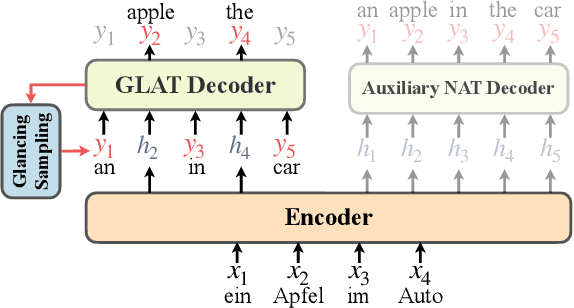

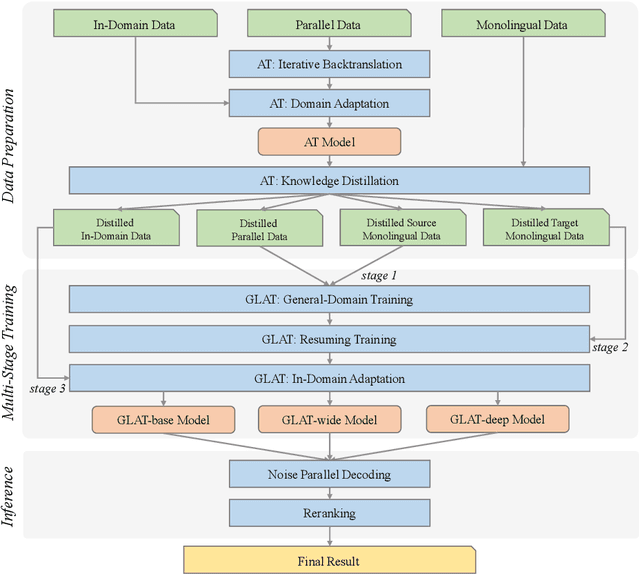
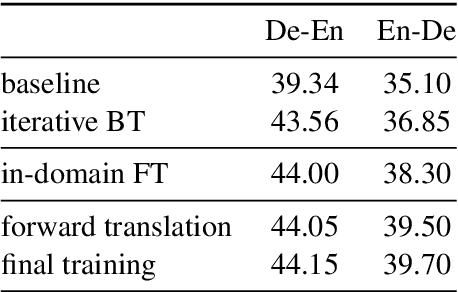
Abstract:This paper describes the Volctrans' submission to the WMT21 news translation shared task for German->English translation. We build a parallel (i.e., non-autoregressive) translation system using the Glancing Transformer, which enables fast and accurate parallel decoding in contrast to the currently prevailing autoregressive models. To the best of our knowledge, this is the first parallel translation system that can be scaled to such a practical scenario like WMT competition. More importantly, our parallel translation system achieves the best BLEU score (35.0) on German->English translation task, outperforming all strong autoregressive counterparts.
UniST: Unified End-to-end Model for Streaming and Non-streaming Speech Translation
Sep 15, 2021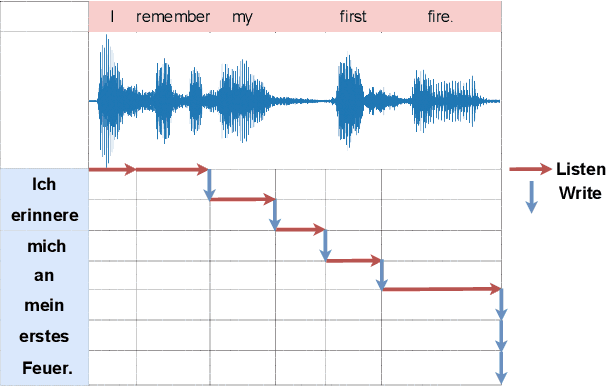

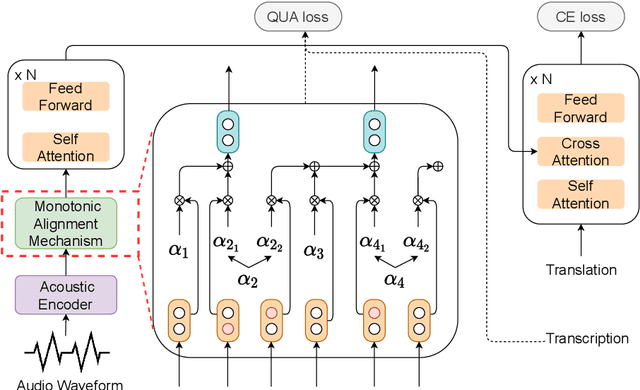
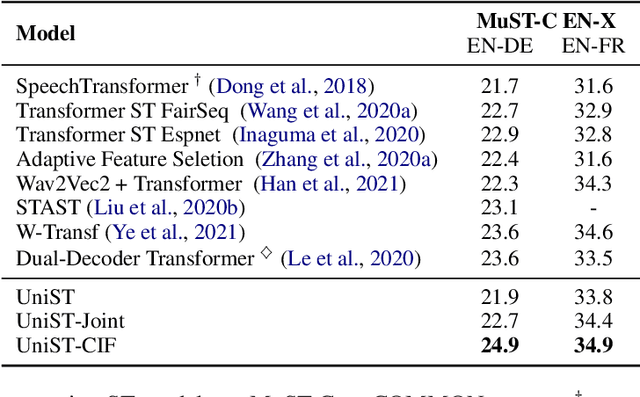
Abstract:This paper presents a unified end-to-end frame-work for both streaming and non-streamingspeech translation. While the training recipes for non-streaming speech translation have been mature, the recipes for streaming speechtranslation are yet to be built. In this work, wefocus on developing a unified model (UniST) which supports streaming and non-streaming ST from the perspective of fundamental components, including training objective, attention mechanism and decoding policy. Experiments on the most popular speech-to-text translation benchmark dataset, MuST-C, show that UniST achieves significant improvement for non-streaming ST, and a better-learned trade-off for BLEU score and latency metrics for streaming ST, compared with end-to-end baselines and the cascaded models. We will make our codes and evaluation tools publicly available.
Serial or Parallel? Plug-able Adapter for multilingual machine translation
Apr 16, 2021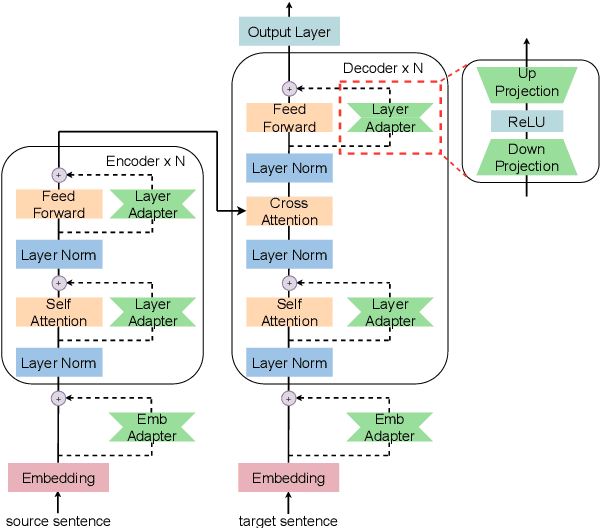

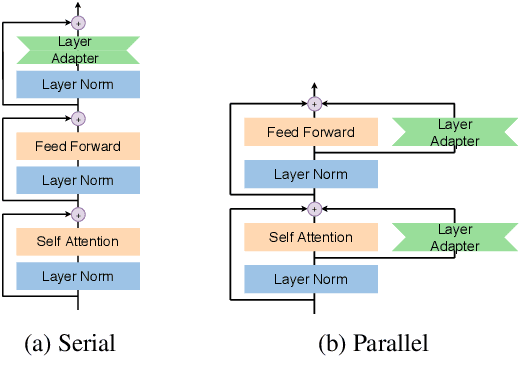
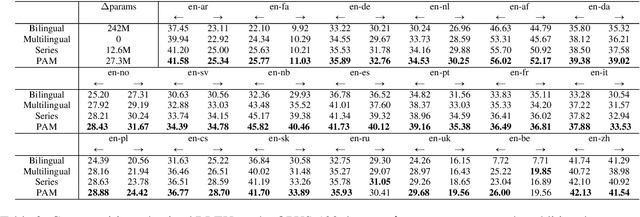
Abstract:Developing a unified multilingual translation model is a key topic in machine translation research. However, existing approaches suffer from performance degradation: multilingual models yield inferior performance compared to the ones trained separately on rich bilingual data. We attribute the performance degradation to two issues: multilingual embedding conflation and multilingual fusion effects. To address the two issues, we propose PAM, a Transformer model augmented with defusion adaptation for multilingual machine translation. Specifically, PAM consists of embedding and layer adapters to shift the word and intermediate representations towards language-specific ones. Extensive experiment results on IWSLT, OPUS-100, and WMT benchmarks show that \method outperforms several strong competitors, including series adapter and multilingual knowledge distillation.
The Volctrans Machine Translation System for WMT20
Oct 28, 2020
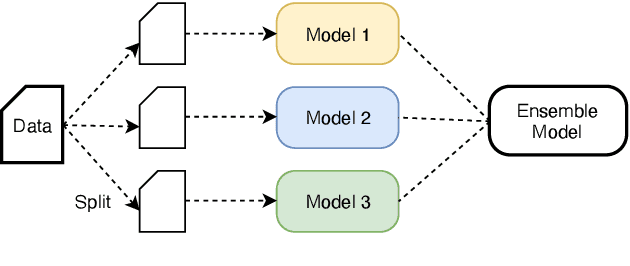
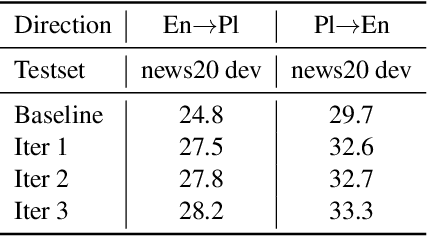

Abstract:This paper describes our VolcTrans system on WMT20 shared news translation task. We participated in 8 translation directions. Our basic systems are based on Transformer, with several variants (wider or deeper Transformers, dynamic convolutions). The final system includes text pre-process, data selection, synthetic data generation, advanced model ensemble, and multilingual pre-training.
GIKT: A Graph-based Interaction Model for Knowledge Tracing
Sep 13, 2020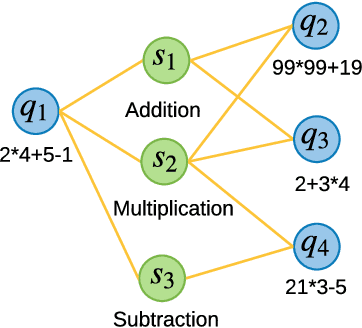
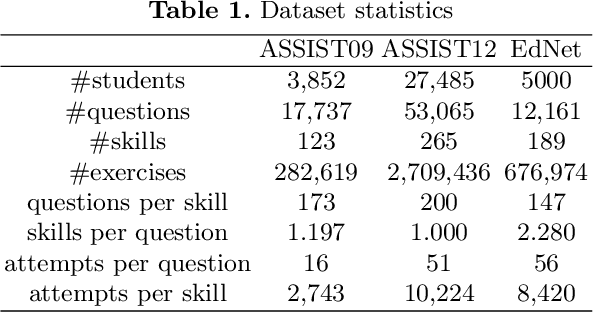
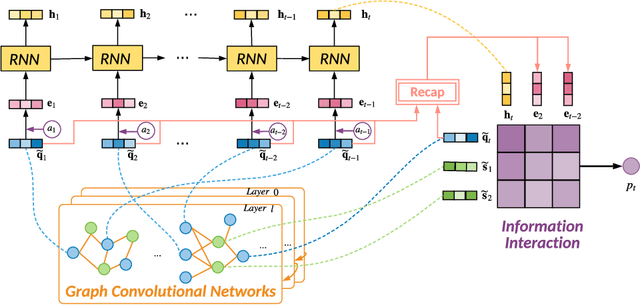
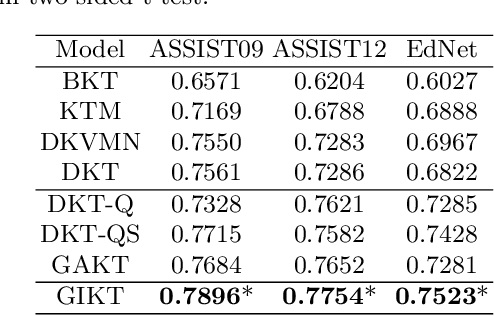
Abstract:With the rapid development in online education, knowledge tracing (KT) has become a fundamental problem which traces students' knowledge status and predicts their performance on new questions. Questions are often numerous in online education systems, and are always associated with much fewer skills. However, the previous literature fails to involve question information together with high-order question-skill correlations, which is mostly limited by data sparsity and multi-skill problems. From the model perspective, previous models can hardly capture the long-term dependency of student exercise history, and cannot model the interactions between student-questions, and student-skills in a consistent way. In this paper, we propose a Graph-based Interaction model for Knowledge Tracing (GIKT) to tackle the above probems. More specifically, GIKT utilizes graph convolutional network (GCN) to substantially incorporate question-skill correlations via embedding propagation. Besides, considering that relevant questions are usually scattered throughout the exercise history, and that question and skill are just different instantiations of knowledge, GIKT generalizes the degree of students' master of the question to the interactions between the student's current state, the student's history related exercises, the target question, and related skills. Experiments on three datasets demonstrate that GIKT achieves the new state-of-the-art performance, with at least 1% absolute AUC improvement.
 Add to Chrome
Add to Chrome Add to Firefox
Add to Firefox Add to Edge
Add to Edge